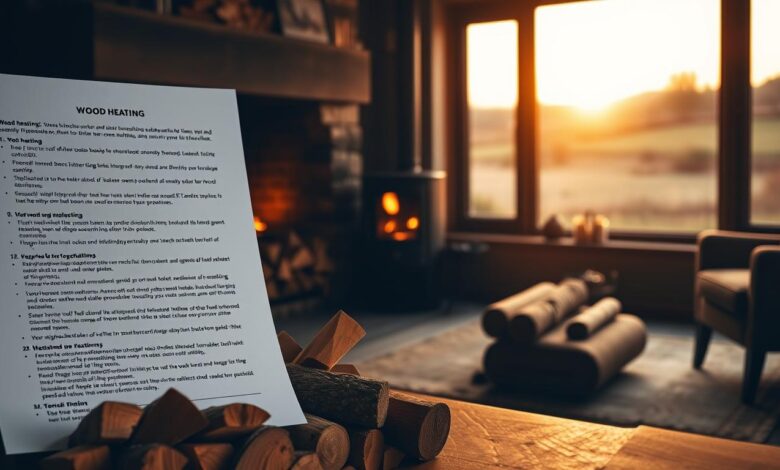Wood Heating in 2025: What You Need to Know About Safe, Legal, and Efficient Firewood Use in the UK

Wood heating is still a favorite among UK homeowners, bringing warmth and charm in winter. As 2025 approaches, new UK wood heating laws will change how we use firewood and wood stoves.
The 2025-2026 UK wood heating laws will bring stricter rules to cut down on environmental harm and improve air quality. If you heat your home with wood, it’s crucial to know these changes. This way, you can stay legal and keep your home warm efficiently.
Learning about these new rules is more than just following laws. It’s about making your home heating sustainable. You’ll need to focus on where you get your firewood, its moisture level, and your stove’s efficiency. This ensures you meet the new environmental standards.
This guide will cover everything you need to know about wood heating in the UK. We’ll talk about legal needs and practical tips for using firewood safely and efficiently. Whether you’ve been using wood heating for years or are thinking about it, we’ll guide you through the changes in home heating.
2025–2026 UK Wood Heating Laws: What’s Changing?
The UK wood heating laws are changing a lot in 2025-2026. These changes are important for homeowners who use wood heating. They aim to lessen environmental harm and make the air cleaner.
New rules will make wood-burning appliances have to meet stricter emission standards. Homeowners will have to get wood stoves that are more efficient and burn cleaner. This means they’ll need to spend money on better equipment.
Fuel rules are also getting tighter. Only fuels that are low in emissions will be allowed. This means old ways of burning wood won’t work anymore. Homeowners will have to use cleaner, seasoned firewood instead.
Wood stove makers will have to make appliances that follow new rules. People will see wood stoves that burn less smoke and heat better. This is because of new technology.
Homeowners who want to install or replace wood-burning systems need to check the new rules. Talking to local authorities or heating experts can help make sure they follow the new laws.
Choosing the Right Firewood: Hardwood vs Softwood

Finding the right firewood can be challenging, especially with UK wood heating laws in mind. The choice between hardwood and softwood affects your heating, the environment, and legal rules.
Hardwood logs, like oak and maple, burn slowly and give steady heat. These dense woods make fires last longer with less smoke. They follow UK wood heating laws well, offering better heat and less smoke.
Softwood, such as pine and cedar, lights up quickly and has bright flames. But they burn fast and make more smoke. This makes them less good for strict UK wood heating laws. They’re best for starting fires or mixing with hardwood.
Choose seasoned or kiln-dried logs for better burning. These have less moisture, making them burn cleaner and more efficiently. Checking moisture levels helps follow environmental rules and gets the most heat.
Knowing the differences between hardwood and softwood helps homeowners choose wisely. This way, they follow legal and environmental rules while heating their homes.
Should Firewood Logs Crackle? Understanding the Sounds of a Healthy Fire
Enjoying a cozy fire is comforting. But should firewood logs crackle? The sounds of crackling logs can actually tell you a lot about your fire. Not all firewood logs crackle the same way. Crackling
Crackling happens when moisture in the wood turns to steam and explodes. Dry, well-seasoned wood crackles steadily and pleasantly. Wet or green wood makes loud, sporadic popping sounds, showing poor burning.
The type of wood affects the sound too. Hardwoods like oak and maple crackle less than softwoods like pine. A healthy fire crackles gently and consistently, showing even burning and good wood quality.
If your firewood logs crackle too loudly or irregularly, it might mean high moisture or wrong wood choice. Proper wood preparation and the right logs can give you a perfect fire sound and good burning efficiency.
Moisture Matters: Why Seasoned or Kiln-Dried Logs Are Essential
Choosing the right firewood is key for your home’s warmth. UK laws stress the need for dry logs for efficient burning. Burning wet wood harms your system and the planet.
Logs with less than 20% moisture burn best. Higher moisture means more smoke, less heat, and chimney problems. This hurts your stove’s performance and breaks UK air pollution laws.
Spotting dry wood is easy. Look for cracks, lighter weight, and a hollow sound. Kiln-dried logs are the best for consistent heat and following the rules.
Good firewood means more warmth, cleaner air, and following UK laws. Your stove works better, your home is cozier, and you help the environment.
Wood Stove Efficiency: Getting the Most Heat with the Least Smoke
Improving your wood stove’s efficiency is key to staying warm and following UK wood heating laws. The right burning method can cut down smoke and boost heat. Understanding air flow and fuel quality is the first step to better heating.
Start fires with dry, seasoned wood that meets UK standards. Build a base with small kindling and add bigger logs slowly. Open air vents at first to help the fire start, then adjust for a steady burn. A bright flame means you’re burning well with little smoke.
Keeping the fire at 350-500 degrees Fahrenheit is important for efficiency. Too low and you get more smoke, too high and you waste fuel. Use a thermometer to check the heat and adjust air flow. This way, you get more heat and follow environmental rules.
Don’t forget about regular maintenance for your stove’s best performance. Clean it and the chimney every year to avoid creosote and ensure air flows right. By doing this, you’ll have a more efficient heater that warms your home and is kind to the environment.
Sustainable Sourcing: Where to Buy Legal and Clean-Burning Logs
Finding the right firewood can be hard, especially with changing UK wood heating laws. Homeowners need places to buy legal, high-quality logs that are good for the environment. Local timber merchants and certified forestry suppliers are your top choices for legal firewood.
Choose suppliers who know UK wood heating laws and can show their wood meets legal moisture levels. Good vendors sell kiln-dried or seasoned logs that burn well and save energy. Look for certifications from groups like the Forestry Commission or woodsure quality assurance.
Online sites focused on sustainable firewood are also great. Sites like Woodsheds Direct and Regional Logs offer wood that follows UK laws. Always ask about the wood’s origin, moisture, and drying before buying.
Opt for local suppliers to cut down on emissions and support local forestry. Sustainable sourcing is more than following rules. It’s about making choices that help our planet and keep our homes warm.
Conclusion: Staying Warm and Compliant in the Heating Seasons Ahead
Understanding UK wood heating laws can be tricky. But knowing the basics makes keeping warm fun and right. As we get closer to 2025, homeowners with wood heaters must know about new rules. These rules focus on protecting the environment and improving air quality.
Lektowoodfuels is a great choice for those looking for legal and effective firewood. Using seasoned or kiln-dried logs cuts down smoke and boosts your stove’s power. The right wood keeps you cozy and follows UK laws.
Choosing sustainable wood heating means making smart picks. It’s about picking the right wood and knowing about moisture and stove efficiency. Every choice affects your home’s warmth and the planet. By picking quality fuel like Lektowoodfuels, you enjoy warm nights and help clean the air.
Preparation is crucial. Learn about local rules, buy top-notch wood, and keep your heater in good shape. With the right steps, you’ll have a warm, efficient, and legal wood heating setup for years.


